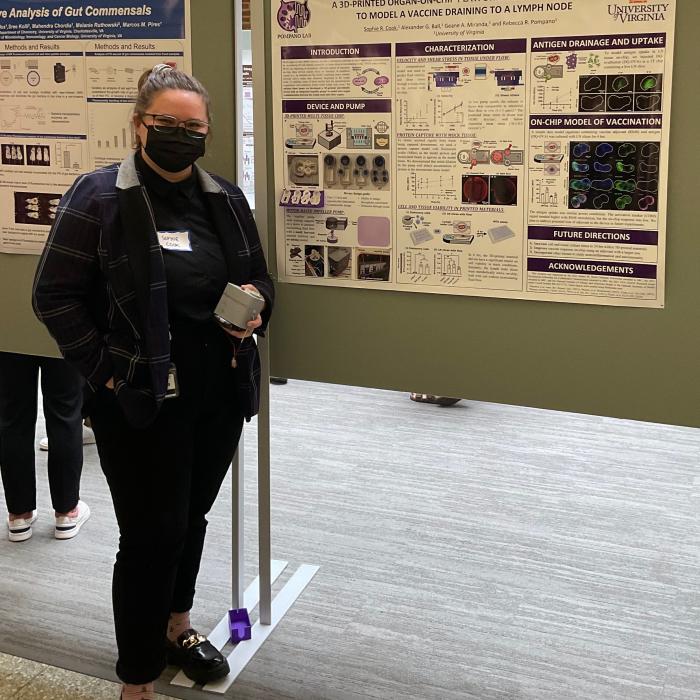News

Chemistry Graduate Student Outreach Highlight: Sophie Cook
Compiled and edited for clarity by Hannah Musgrove
Sophie Cook
DEI Journal Club Co-Leader
Bioanalytical Chemistry, 6th Year
The DEI Journal Club is a monthly meeting where Sophie Cook and Jon Zatorski host discussions on peer-reviewed literature regarding topics in Diversity, Equity and Inclusion. The variety of topics covered ranges from racial bias to LGBTQIA+ disparities in STEM. Discussions amongst small groups of students and faculty are led by student volunteers. Sophie and Jon developed this series, and they work to set up the meeting times, locations, and participate in leading presentations when other volunteers are unavailable. ChemSciComm was able to meet up with Sophie to learn more about her perspective and leadership as a graduate student for this journal club.
What brought you to UVA Chemistry?
“I didn’t want to do chemistry until freshman year of college, where I had a really good professor in the subject. I had always had an interest in building and creating things, but I didn’t see that in chemistry for a while. After undergrad, UVA seemed interesting to me as a choice because 1) I thought Charlottesville seemed cute, 2) I wanted to do microfluidics, and had a list of microfluidics labs to check out at UVA, and 3) I connected with Rebecca [Pompano] as a young female PI. I felt like the lab really pushed the boundaries of discovery in the field of immunology. I was really interested in her lab, and I found it to be a good match.”
What inspired you to start leading the DEI journal club?
“I wanted to do something similar to a book club setting, as a low-stakes meetup to highlight awareness of DEI issues. Rebecca had a newsletter asking for volunteers for a similar journal club, so Jon and I both volunteered. The first meeting was so interesting and fun, that we decided to keep it going once a month. We also liked the idea of having other volunteers for more engagement and I feel really passionate about DEI and wanted to continue to be involved.”
Are there outcomes from this role, challenging or rewarding, that have been meaningful to you?
“We have had a few student volunteers which is great because people are really busy, and I’m hoping that the discussions we are having start to lead to changes in the department. Eventually, I want to be able to pull in people who wouldn’t normally go to a meeting regarding DEI topics. In general, I would like to explore paths to bring in more people, possibly by offering food at events.
One challenge has been bringing up engagement and ensuring that others know these events are happening. I have plans to increase engagement, and we are connecting with the DEI committee to help spread awareness. Being a part of the department committee will likely be a big help. A rewarding part has been pushing myself to read the papers for each journal club meeting. I’ve presented at each meeting so far, and I’ve had opportunities to read papers I wouldn’t normally read. This has been rewarding because I see the actual results in the papers and [have learned] how the studies are put together.”
What does it mean to you to be a part of the Chemistry community, either in the department or in a broader sense?
“Something that I like, is it’s fun to be with people who are excited about learning and wanting to make a change.“
What advice would you give to graduate students wanting to get more involved in the department or community as a whole?
“If you are interested in something, do it. If you have an idea for something, go after it. Or even talk to somebody about someone else doing it. There were many times I wanted to do something more in the department, and now that I’m finishing my degree, there isn’t time to do them. I got really lucky with the DEI Journal Club, as journal clubs have a clear layout, so we were able to start it [relatively quickly]. If you are wanting to try something, there are likely others who also want to do things as well, and the department wants to support us in these ideas. Take the opportunities when you can! For DEI in particular, I think a lot of people can get nervous about getting involved in DEI if they feel that they are not representative of a particular minority, but it is important to have support and involvement from everyone.“
Thank you, Sophie!
If you are interested in participating or learning more about the DEI Journal Club, you can contact Sophie Cook (src3qd) or Jon Zatorski, as well as the Chemistry DEI Committee for more information. Email reminders for meetings are typically sent through the Departmental listserv.
